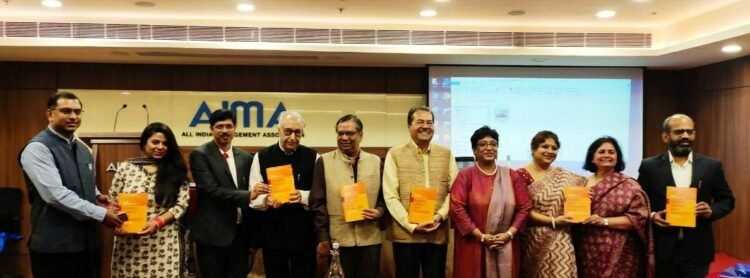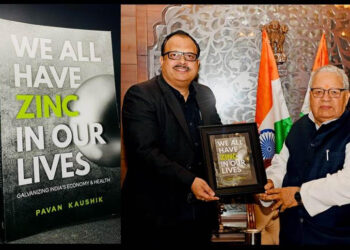The book ‘Mandated Corporate Social Responsibility (CSR): Evidence from India’ was released at All India Management Association (AIMA), New Delhi, in the morning of 23 November 2019.
Present on the occasion were over 60 CSR authors and practitioners, senior corporate executives, senior academicians, budding researchers and aspiring managers in the Corporate Social Responsibility (CSR) and Sustainability domain. Dr. Raj Agrawal, Director, Centre for Management Education (CME), AIMA; Dr. Nayan Mitra, Co-Editor of the Book that was released; Dr. Bhaskar Chatterjee, pioneer of CSR knowledge and practice in India and other authors such as Dr. Sumona Ghosh, Ms. Anushree Poddar, Dr. Manoj Dash, Dr. Tanuja Sharma and Prof. Jones Mathew, who have contributed articles on different CSR related issues to the book, were present on this special occasion.
After release of the book, Dr. Nayan Mitra, Founder-Director, Sustainable Advancements (OPC) Private Limited presented a short introduction as to how the book has become a reality and the main thematic areas it has covered. Immediately afterwards the first panel discussion was initiated by Dr. Mitra who introduced the panelists to the audience. The panelists included Dr. Bhaskar Chatterjee, Dr. Sumona Ghosh and Ms. Anushree Poddar.
Dr. Sumona Ghosh, Head of Business Regulatory Framework, St. Xaviers College, Kolkata presented data from her article on pre and post mandate spending by top corporates and said that the post mandate period has not only seen more spending but also structured spending as well as reporting.
Ms. Anushree Poddar, Senior Research Fellow, TERI School of Advanced Studies, New Delhi detailed how CSR interventions need to align themselves with Sustainable Development Goals (SDGs) thereby leading to enhancing human development and well-being. She emphasized that there is need for increased spending in the north-eastern states to enable to catch up with pace of development in other states.
Dr. Bhaskar Chatterjee, widely acclaimed as the Father of CSR in India gave a glimpse of how the legislation materialised on the face of opposition from vested interests. He said it has led to availability of the most important factor that enables targeted development, i.e. data. He also highlighted that the legal mandate has not only spurred new activities, employment, growth of academic and research interest around CSR but also led to Companies positively looking at CSR as a constructive tool in their hands to create optimism and elicit support of stakeholders.
The second panel discussion was shortly initiated after the first one was summarized by Dr. Mitra succinctly.
Dr. Manoj Dash, Head-CSR & Sustainability of Odisha Power Generation Corporation (OPGC) Ltd., Odisha, was the only CSR practitioner from the field on this panel. He outlined the CSR strategy of OPGC which is based on stakeholder management approach propounded by Edward Freeman in early 1980’s. Other specific goals like alignment with rules, SDGs, Schedule VII, etc. just fall in place.
He also cited a few challenges that practitioners and industries face from district and state level bureaucracy which arise either because of inadequate understanding of the mandate or respect for this central law. Finally, he raised issues regarding overall corporate conduct that should favour social responsibility of business and government also must look at efficiency and effectiveness in utilisation of funds at its own disposal while asking corporates to spend CSR resources fully.
Dr. Tanuja Sharma, Professor and Area Chairperson in Human Resource Management, Management Development Institute (MDI), New Delhi, reminisced her field visit experiences to evaluate CSR interventions by corporates before the mandate and afterwards. She said there is difference visible in spending as well as reporting of CSR spending while a lot still needs to be done by corporates to match their claim in reports with the reality that can be seen on ground in terms of visibility of the projects being implemented and their effect on improving people’s lives.
Dr. Jones Mathew, Professor of Marketing, Great Lakes Institute of Management, Gurgaon brought into the discussion a shift from CSR spending and reporting centric discussions to introduce as to how corporates can leverage the strategic value of CSR by reflecting it through innovative branding and brand equity management in order to enhance corporate image and reputation.
He highlighted that CSR offers a unique opportunity to raise corporate image by capturing the multiple connects between the corporate’s social responsibility portfolio and the people that these interventions impact positively. Doing this consistently and with planning would not only enhance corporate experience of employees but also of customers as well as other stakeholders about the corporate’s positive persona in the fiercely competitive marketplace.
A video recording sent by co-editor, Dr. Rene Schmidpeter, Dr. Juergen Meyer Endowed Chair of International Business Ethics and Corporate Social Responsibility, Cologne Business School, Germany was played thanking and congratulating Dr. Nayan Mitra, Springer Nature, Switzerland and AIMA for accelerating this excellent and timely publication and its launch. This book belongs to Springer’s CSR, Sustainability, Ethics and Governance series, with series editors Samuel O. Idowu and Rene Schmidpeter.
At the end, Dr. Ganesh Singh, Programme Director, PhD programme, thanked Dr. Nayan Mitra and all authors who have contributed to the book and the audience for their presence at this event.





















